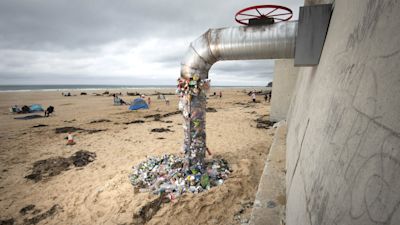Lords force government U-turn over dumping of raw sewage in rivers and sea

Peers have forced the government to U-turn over the dumping of raw sewage in rivers and the sea, the latest in a legislative tussle the Environment Bill as the UK prepares to host the Cop26 global climate summit in Glasgow from October 31.
The bill will be sent back to the Commons where the government will table its own amendment after the House of Lords, backed a majority of 153, a proposal to place a new legal duty on water companies to “take all reasonable steps” to prevent sewage discharges.
The concession comes after Downing Street defended Tory MPs who rejected the plan, saying the amendment they were voting had not had its exact costs calculated.
Earlier, a spokesman for Prime Minister Boris Johnson said the government "completely agrees" that it is unacceptable for water companies to dump raw sewage in the country's rivers, but claimed the bill already contained provisions to punish polluters.
He said the amendment's intention to put a legal duty on water companies to stop raw sewage from being poured into waterways, is "already being delivered".
Environmental campaigners, including Surfers Against Sewage, said they were disappointed that 268 MPs - against 204 - disagreed with proposals to amend the bill.
The vote's result sparked a furore on social media, with furious users accusing the government of allowing river pollution to continue.
In response to the outrage, the government said it would "bolster the present raft of measures" to ensure there are "more protections against water pollution".
On the Commons vote, the PM's spokesman said: "We completely agree that the current failure of water companies to adequately reduce sewage discharges is unacceptable."
The spokesman added that the amendment put forward by Tory peer the Duke of Wellington "remains un-costed", but "the initial assessments are over £150 billion and that would mean that individuals - every one of us as taxpayers - paying potentially thousands of pounds each as a result."
Downing Street said that, as a result, "it's not right to sign a blank cheque on behalf of customers without understanding the trade-offs and the bills that would be involved".
The COP27 climate conference - what you need to know
What is COP27? When and where will it be?
What is COP27? When and where will it be?
Each year, the United Nations Framework Convention on Climate Change (UNFCCC) meets at what is called the Conference of the Parties (abbreviated as COP) to discuss the world's progress on climate change and how to tackle it.
COP27 is the 27th United Nations Climate Change Conference of the Parties summit which will be held in Sharm El Sheikh, Egypt from November 6-18.
Who is going?
Who is going?
Leaders of the 197 countries that signed the United Nations Framework Convention on Climate Change (UNFCCC) - a treaty that came into force in 1994 - are invited to the summit.
These are some of the world leaders that will be attending COP27:
UK Prime Minister Rishi Sunak is attending the conference, after initially saying he wouldn't as he was too busy focusing on the economy within his first weeks in office.
US President Joe Biden and his experienced climate envoy, John Kerry, will appear at the talks.
France President Emmanuel Macron will also be among the heads of state from around the world staying in Egypt.
King Charles III will not be attending COP27, despite being a staunch advocate for the environment. The decision was made jointly by Buckingham Palace and former prime minister Liz Truss.
Elsewhere, Russian President Vladimir Putin and his Chinese counterpart Xi Jinping will not attend the talks just as they decided to do for COP26.
What is it hoping to achieve?
What is it hoping to achieve?
1. Ensure full implementation of the Paris Agreement and putting negotiations into concrete actions - included within this is the target of limiting global warming to well below 2C.
2. Cementing progress on the critical workstreams of mitigation, adaptation, finance and loss and damage, while stepping up finance notably to tackle the impacts of climate change.
3. Enhancing the delivery of the principles of transparency and accountability throughout the UN Climate Change process.
MPs who voted against the amendment came under fire from campaigners and Defra, which said it was unacceptable that raw sewage was put into coastal waters and rivers in England more than 400,000 times in the last year.
The Shadow Defra secretary, Luke Pollard, said: "People are right to be upset at the dreadful state of England's rivers. Not one English river is in a healthy condition and there has been zero improvement since 2016.
"The government is to blame for allowing water companies to vent raw sewage into our rivers and sea seemingly at will."